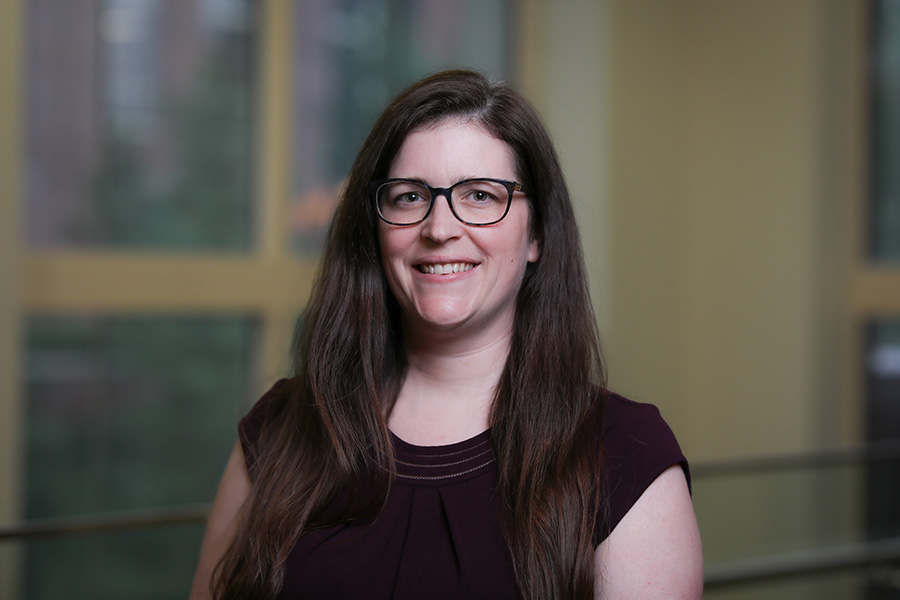Colleen Ganley
check Recruiting a graduate student for Fall of 2026

Education
Boston College, 2011
Research Interests
The overarching goal of Colleen Ganley's research is to better understand factors that contribute to students’ mathematical learning and science, technology, engineering and mathematics (STEM) career interests. She is particularly interested in the early development of math anxiety as well as other math attitudes, spatial skills, working memory, gender differences in math, and the role of parents and teachers in children’s math attitudes and learning. In her work, she develops new measures, collects and analyzes longitudinal data, and uses advanced statistical techniques. Most of Ganley's research has been descriptive or exploratory, aimed at informing interventions to help children learn math. More recently, the lab has begun to develop and test an intervention for decreasing math anxiety in children.
Lab Description
In the Math Thinking and Learning Lab, undergraduate students, graduate students, research staff, and postdoctoral researchers work together to study factors related to learning in math. They do both lab-based research with children and college students as well as field research in elementary schools. They collect data using questionnaires, assessments, and observations, and conduct intervention work with children. They also adopt open science practices such as preregistration and sharing our materials, data, and analysis code. The lab is also affiliated with the Florida Center for Research in STEM within the Learning Systems Institute at FSU.
Barroso, C., Ganley, C. M., Schoen, R. C., & Schatschneider, C. (2023). Between a growth and a fixed mindset: Examining nuances in 3rd-grade students' mathematics intelligence mindsets. Contemporary Educational Psychology, 73, 102179.
Conlon, R. A., Barroso, C., & Ganley, C. M. (2023). Young children's career aspirations: gender differences, STEM ambitions, and expected skill use. The Career Development Quarterly, 71(1), 15-29.
Lubienski, S. T., Ganley, C. M., Makowski, M., Miller, E., & Timmer, J. (2021). "Bold problem solving": A new construct for understanding gender differences in mathematics. Journal for Research in Mathematics Education, 52(1), 12-61.
Barroso, C., Ganley, C. M., McGraw, A. L., Geer, E. A., Hart, S. A., & Daucourt, M. (2021). A meta-analysis of the relation between math anxiety and math achievement. Psychological Bulletin, 147(2), 134-168.
Ganley, C. M., Conlon, R. A., McGraw, A. L., Barroso, C., & Geer, E. A. (2021). The effect of brief anxiety interventions on reported anxiety and math test performance. Journal of Numerical Cognition, 7(1), 4-19.
Geer, E. A., Quinn, J. M., & Ganley, C. M. (2019). Relations between spatial skills and math performance in elementary school children: A longitudinal investigation. Developmental Psychology, 55, 637-652.
Ganley, C. M., Schoen, R. C., LaVenia, M., & Tazaz, A. M. (2019). The construct validation of the Math Anxiety Scale for Teachers. AERA Open, 5, 1-16.
Hart, S. A., & Ganley, C. M. (2019). The nature of math anxiety in adults: Prevalence and correlates. Journal of Numerical Cognition, 5, 122-139.
Ganley, C. M., & Lubienski, S. T. (2016). Mathematics confidence, interest, and performance: Examining gender patterns and reciprocal relations. Learning and Individual Differences, 47, 182-193.
Ganley, C. M., & McGraw, A. L. (2016). The development and validation of a revised version of the Math Anxiety Scale for Young Children. Frontiers in Psychology, 7, 1181.
For a full list of publications, see here: http://www.mtllabfsu.com/publications.html
Undergraduate Research
Explore the Directed Individual Study (DIS) opportunities below or learn more.

